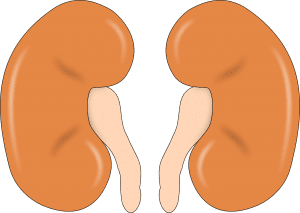Alport Syndrome
What is Alport syndrome?
Alport syndrome is a rare, genetic disease that is characterized by the progressive loss of kidney function. Those with this disease may also experience abnormalities in the eyes and hearing loss. Males with this syndrome are more likely to develop these symptoms than females. One out of every 50,000 newborns will have Alport syndrome.
What are the symptoms of Alport syndrome?
The main symptom of Alport syndrome is a progressive loss of kidney function, which leads to end stage renal disease. These problems with the kidneys bring other symptoms, such as blood and high levels of protein in the urine, hypertension, and swelling of the ankles, legs, feet, or around the eyes.
Abnormalities of the ears are another symptom of this disease. During late childhood or early adolescence, people often develop issues with their inner ears and have sensorineural hearing loss. Problems may also occur within the eyes. Misshapen lenses and abnormal coloration of the retina are common symptoms of this syndrome, but they rarely lead to vision loss.
What causes Alport syndrome?
Mutations in the COL4A3, COL4A4, and COL4A5 genes cause this syndrome. They are responsible for the instructions for type IV collagen, which is needed for normal kidney function. This protein is necessary for a group of blood vessels that remove water and waste from the blood, called glomeruli. When the glomeruli cannot effectively remove waste, it allows blood and protein to be excreted with urine. As the syndrome progresses, scarring occurs and leads to kidney failure.
As type IV collagen is also important in inner ear and eye structures, these mutations are responsible for eye and ear symptoms. Abnormal type IV collagen causes misshapen lenses, discoloration of the retina, and abnormal inner ear structures.
The majority of cases are inherited in an X-linked pattern through a mutation in the COL4A5 gene. About 15% of cases are caused by mutations in either the COL4A3 or COL4A4 genes, and they are inherited in an autosomal recessive pattern. In extremely rare cases, at about 5% of all of those with Alport syndrome, this disease is inherited in an autosomal dominant pattern.
How is Alport syndrome diagnosed?
After noticing these symptoms, a healthcare professional will need to know medical and family history. They may perform tests to confirm a diagnosis. These tests include a urine test, blood test, glomerular filtration rate (GFR), kidney biopsy, hearing test, vision test, and genetic testing.
What are the treatments for Alport syndrome?
There is no cure for Alport syndrome. Treatment is symptomatic and meant to slow the progression of the loss of kidney function. Doctors may prescribe medications to control high blood pressure, diuretics, and recommend a lowering of salt in the diet. If the progression of the disease is severe, a kidney transplant may be the best option.
Where can I find out more about Alport syndrome?
Alport Syndrome Articles

FDA Grants Orphan Drug Designation to Setanaxib for Alport Syndrome

Researchers Work to Develop Novel Gene Therapies for Alport Syndrome


New 2.25 Million Dollar Grant will Support Gene Therapy Research for Alport Syndrome


A Five Year $2.25M Grant Has Been Awarded for the Study of Alport Syndrome

Kalamazoo Family Joins Kidney Walk to Support Son with Alport Syndrome





